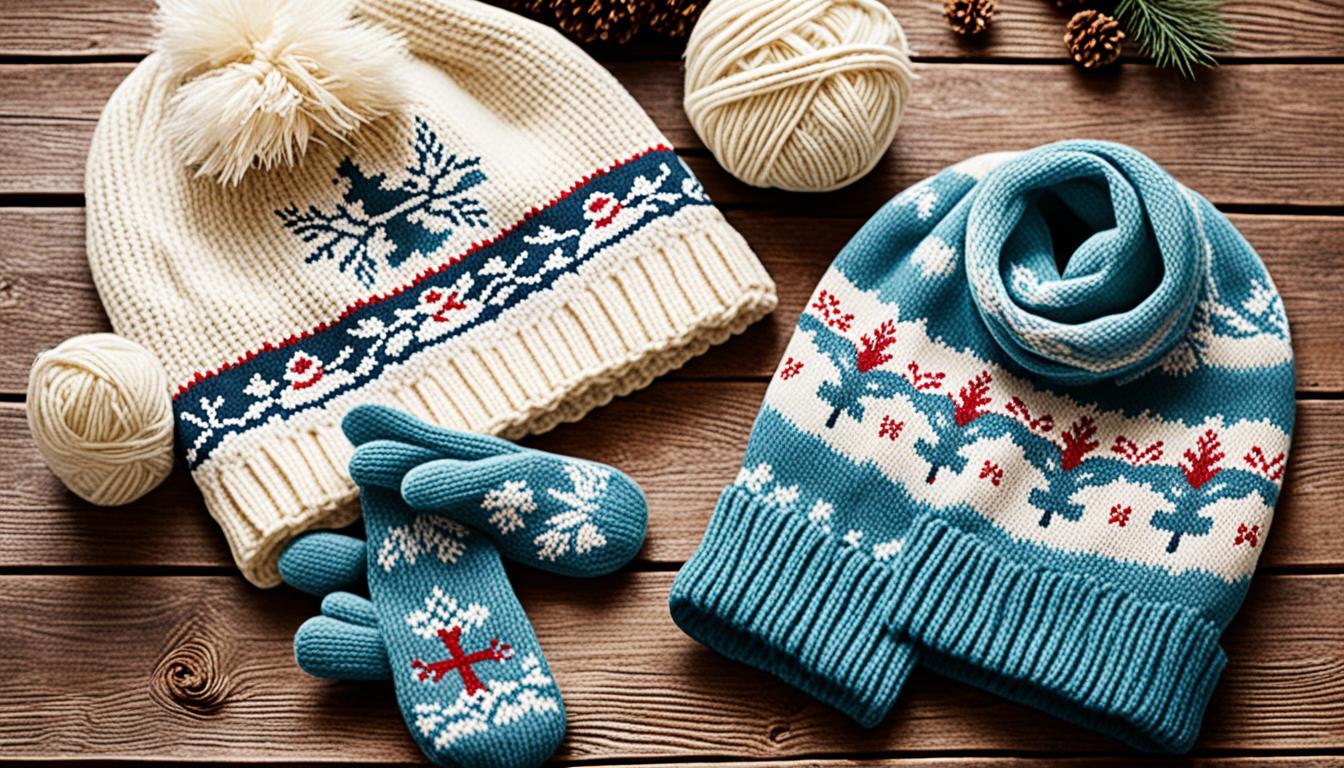Knitting mixed with the precision of cross stitch patterns brings new creative opportunities to crafters. It’s a unique approach that can lead to stunning results. The blend of these two techniques is surprisingly harmonious.
This article explores how knitting and crossstitching embroidery work together, using a special cross stitch pattern from Etsy for illustration. The pattern is of two sweet matches saying they are a “match made in heaven.” It shows the fun and charm that crossstitching can add to knitting. You can download this pattern, get its size on an 18-count aida cloth, and learn what thread colors to use.
Although it’s fun and full of puns, this design is a great example of how to mix cross stitch and knitting effectively. It makes projects more appealing and brings out the crafter’s skill with detailed cross stitch charts.
Key Takeaways
- The seamless integration of knitting and cross stitch patterns can unleash numerous creative opportunities.
- This unique crossstitching pattern on Etsy highlights the charming personality that cross stitch can add to knitting.
- Dimension details and thread requirements are provided for precise project execution.
- Combining these two crafts can be both innovative and adhering to tradition.
- Cross stitch patterns and designs cater to various themes, enhancing the versatility of knitting projects.
The Basics of Cross Stitch Patterns
Cross stitch patterns have a rich history, coming from ancient traditions of needlework. This guide talks about their journey and how they’ve become a fun pastime today.
History and Origins
The crossstitching history dates back to early embroidery. It has flourished through different cultures, staying true to its roots. Now, it’s one of the simplest embroidery types, attracting people of various skill levels.
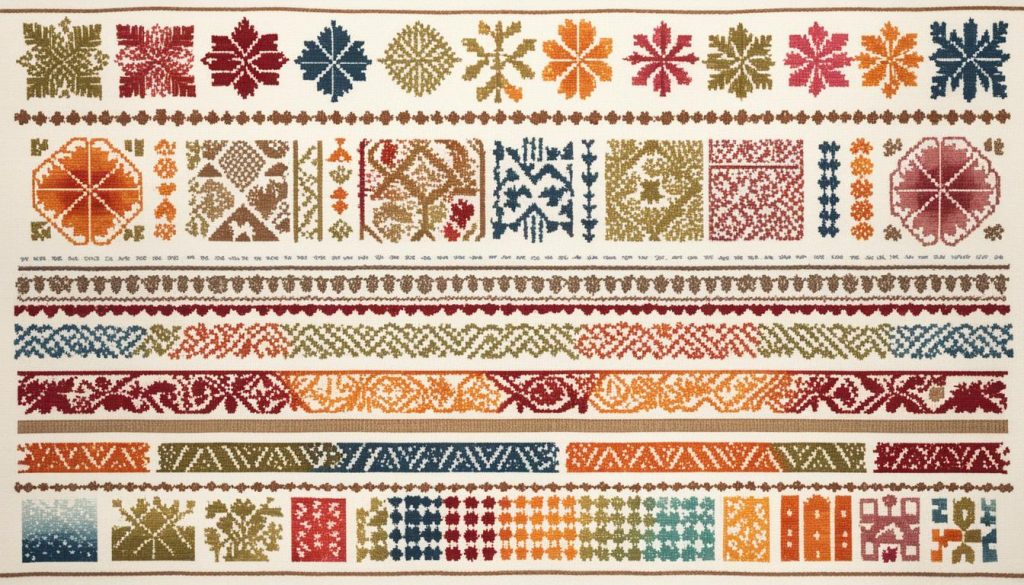
Understanding Cross Stitch Kits and Designs
Starting with beginner crossstitching is easy with kits. They come with everything you need, like patterns, fabric, crossstitching needles, and threads. Many kits have cute themes or modern designs, making the craft welcoming for everyone.
Essential Cross Stitch Supplies
To begin, gather some basic supplies. You’ll need a pattern, a hoop or frame, crossstitching fabric (Aida cloth is common), needles, and threads. The DMC embroidery floss is a favorite for its quality.
| Supply | Description |
|---|---|
| Aida Cloth | A commonly used cross stitch fabric, recommended in size 14 for ease and clarity. |
| DMC Embroidery Floss | This cross stitch thread is preferred for its quality and availability, typically used in two-strand segments. |
| Cross Stitch Needle | Designed to glide through fabric without damaging the weave, a must-have in your collection of cross stitch needles. |
| Hoop or Frame | Essential for keeping your fabric taut, aiding in even stitching. |
It also helps to have a few extra tools like a needle minder, threader, and scissors. For starters, it’s best to use tutorials that teach basic stitches. This means focusing on full cross stitches and avoiding more complex techniques.
Why Combine Knitting with Cross Stitch?
Combining knitting and crossstitching opens up new horizons for crafters. They can now add detailed images and personal touches to their fabric pieces. The two crafts work well together because they share similar elements like stitches. This ensures the fabric doesn’t lose its stretch.
For DIY crossstitching, using many yarn colors can make designs pop. A design drawn on a grid is great for different techniques, from intarsia to needlepoint. This makes the process versatile. Small projects, with a motif that’s five stitches wide and five rows high, work best. For example, they’re great for socks, mittens, and hats.
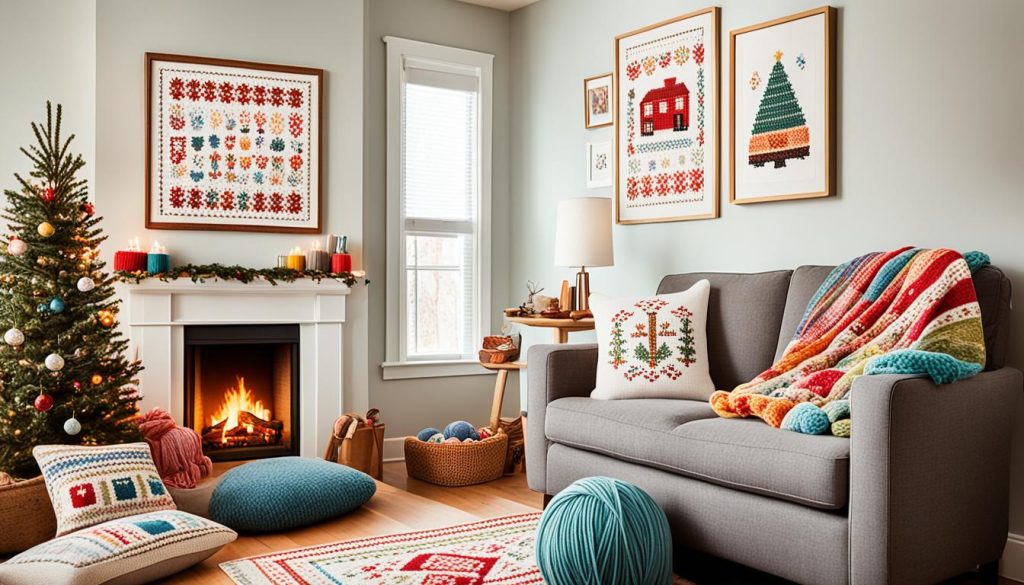
To combine these crafts successfully, you need to be precise. Start by marking the center of your work. Then, count stitches and rows. Follow the chart from right to left. Making your embroidery slightly loose gives it a fuller, brighter look.
For larger projects, a magnetic guide can be very helpful. It helps keep track of rows in complex designs. This keeps your work neat and attractive. This approach allows you to make unique, custom crossstitching gifts and home decor pieces.
Adding crossstitching to knitting makes items look more beautiful. It offers a way to show creative artistry. This mix is perfect for creating special, one-of-a-kind gifts or sprucing up your home. It personalizes every project you work on.
Choosing the Right Materials for Your Projects
When you mix knitting with cross stitch, picking the right materials is key. Start by choosing the cross stitch fabric. It sets the base for your work.
| Fabric Type | Common Counts | Characteristics | Recommended Use |
|---|---|---|---|
| Aida | 14, 11, 16, 18, 20 | Easy to use, visible squares | Beginner projects |
| Evenweave | 25, 28, 32 | Smoother weave, finer finish | Intermediate to advanced projects |
| Linen | 28, 32, up to 50 | Natural texture, various counts | Advanced projects |
Every crossstitching fabric has its own advantages. For kids’ projects or a larger stitch, consider Aida, specifically 6-count Aida, also known as Herta.
Don’t forget about the threads, or floss. You can pick from cotton, silk, metallic, wool, and variegated cross stitch threads. The type of threads you choose impacts how your project looks and lasts:
- Cotton: Widely available and simple to use.
- Silk: Shiny but delicate.
- Metallic: For a bit of sparkle.
- Wool: Adds texture.
- Hand-dyed fabric: Makes your project unique.
Picking the right crossstitching needles is important too. Go for tapestry needles with blunt tips. They help avoid pricking your hands and glide well through the fabric. The needle size should match both the fabric and thread.
In addition to these main materials, you’ll need embroidery hoops, sharp embroidery scissors, and needle threaders for smooth stitching. For new stitchers, go with 14-count Aida for its simplicity. As you gain more experience, you might prefer finer fabrics or linen.
Choosing the perfect mix of crossstitching fabric, threads, and needles ensures your creation is both stunning and long-lasting.
Tips for Beginners
Starting your crossstitching journey can be both fun and a little scary. Here are some practical tips for newbies. They’ll help you start smoothly.
Starting with Counted Cross Stitch
Counted crossstitching is perfect for first-timers. It teaches you how to follow patterns and stitch evenly. Working with Aida cloth is a good way to get the hang of it. Aida’s smooth weave helps you count stitches and stick to patterns. Be sure to keep your stitching tension the same and not make big jumps at the back of the fabric.
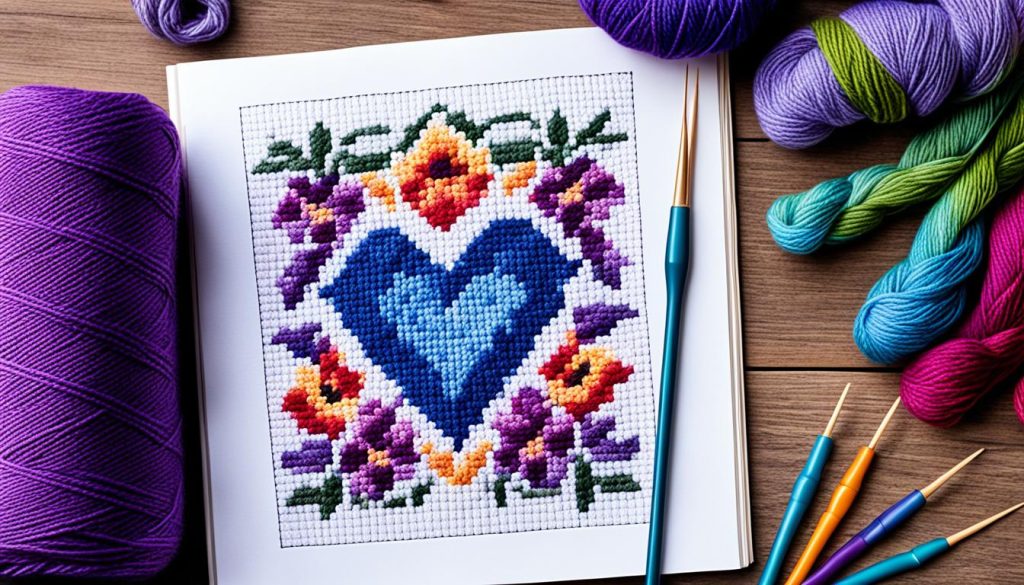
Free Cross Stitch Patterns for Practice
Using free patterns is a smart move to feel more confident. Places like DMC have lots of free designs. You can find easy and harder patterns online. It’s a cool way to try new stitches and techniques without feeling rushed. Simple patterns or samplers are great for beginners.
Common Mistakes to Avoid
When you’re just starting, you might make some common mistakes. But knowing what they are can help you dodge them:
- Miscounting Stitches: Keep an eye on your stitching to avoid mistakes.
- Knotting Threads: Stop and let the thread spin to avoid knots.
- Wrong Needle Size: Pick the right needle for your project’s fabric and thread.
And if you take the Aida out of the hoop when you’re not using it, it won’t get creased. A needle minder helps keep your needles in one place. Or, making sure you have all the materials before you start means you won’t run short on thread. Stitching where the light is good makes your work more accurate.
Get going with a confident spirit! Use tutorials, dive into cross stitch communities, and explore many patterns. This is how you keep getting better at cross stitch.
Cross Stitch in Modern Crafting
Cross stitch is now a big hit with today’s crafters. It blends old techniques with new styles. You’ll see a mix of designs, from simple letters to detailed animals.
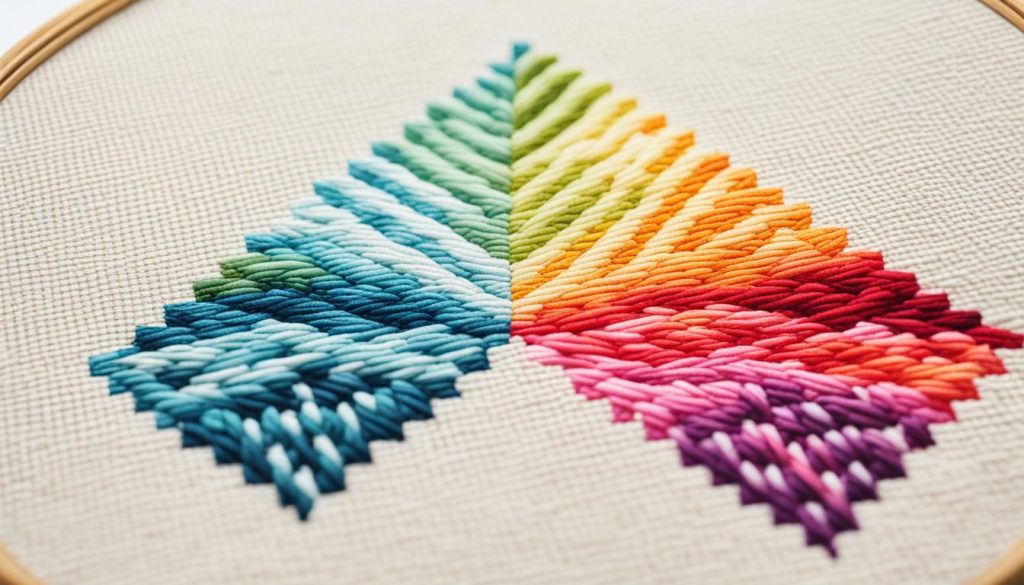
It’s easy to get patterns in kits nowadays. This has helped cross stitch grow in the crafting world. Aida and linen are the main fabrics used, perfect for the X stitches.Embroidery hoops are often used by beginners for easier stitching.
Popular Cross Stitch Patterns: From Alphabets to Animals
There’s a pattern for everyone in modern cross stitch. Alphabets are great for adding personal touches or making learning fun. Animals are top picks for those wanting to add a cute touch to items.
Cross Stitch Trends in Home Decor and Gifts
Cross stitch is changing how we decorate our homes. Pillows, framed pieces, and wall art are key in today’s look. It’s also a favorite for special gifts, adding a personal feel to celebrations.
Conclusion
Crafting with crossstitching patterns blends endless creativity and self-expression.
It explores a rich history and lists what you need for great projects.
Mixing knitting with cross stitch can make your work even more beautiful.
The right crossstitching kits, materials, and patterns will boost your crafting joy.
For starters, knowing how to stitch right and use thread wisely is key.
Cross stitching has calming effects, sharpens focus, and betters your hand skills.
It lets you make unique pieces to keep in your family.
Now, crossstitching designs are up-to-date yet classic, fitting everyone’s style.
Places like Etsy have lots of patterns, showing how loved this craft is.
Combining these crafts leads to new ideas and keeps the joy of creating alive.
